Matthew Weiner Talks Mad Men Finale. An Update On His Film You Are Here. Plus, An Essay On Season Three
Since no one on the Internet is discoursing on the season three finale of Mad Men, the show's creator, Matthew Weiner, has decided to do just that in a new interview. After the jump, we'll dive into Weiner's candid explanations for the massive changes that went down last Sunday and how they may or may not bleed into season four. We also intertwine our thoughts on the finale and our opinion of the entire season.
Before we get into that, the trades report that Weiner's directorial movie debut, You Are Here, has been delayed until 2011. The primary cast for the romantic comedy, which includes Jennifer Aniston, Zach Galifiankis, and Bradley Cooper, is said to still be aboard the project. Though no further details are given on a time frame, Mad Men's fourth season is cited as the reason for the production's delay. Weiner also has a very-active film deal set up at Lionsgate.
But what of Sunday? Make no mistake, Mad Men is a great series, but we did find the finale, while exciting and epic, to underscore a problem observed throughout this season: Weiner's ambitious decision to explore Don Draper's adulterous domestic life and his need to load up on peripheral characters outside of Sterling Cooper has dulled our connection to the actual Mad Men. It's not that they're exceedingly selfish bastards—we're cool with that—but some of them now border on office dressing. Blasphemy you say? "Shut the Door, Have a Seat," and let us know your opinions in the comments. Spoilers below and my comparison of Mad Men to The Office...
The Drapers and Henry Francis: In the only post-finale chat he's conducted thus far, Matthew Weiner shared with Jace Lacob at The Daily Beast that the marriage between Don Draper aka Dick Whitman and Betty Draper aka Betts aka "Whore" is toast in his eyes. Sure, this may seem like a given following Betty's "I'm off to Reno" divorce scene in Sunday's ep, but as critic Alan Sepinwall pointed out before Weiner's interview: the planned divorce does not cancel out a reconciliation down the road or sooner. Moreover, Weiner's affinity for the actress who plays Betty, January Jones, is often reiterated in the press. One has to wonder the extent to which Jones's involvement will be reduced next season per the creative decision; also, may so much focus and emphasis on Jones's character this season (resulting in countless mag covers) partially be due to the fading exposure of Betty in future seasons? Just an idea. Well, regarding the marriage itself, Weiner doesn't hesitate to clarify...
It's so unambiguous to me that this marriage is over, but the audience seems to cling to the idea that they should be together because we want to believe in those things. The marriage was not good. It was built on a lie and the lie was exposed. ...I do believe when he says his mother was a 22-year-old prostitute that Betty is looking at something that is very far from what she had planned for herself...
One character that has really boggled viewers, especially in the penultimate JFK-and-Oswald-got-popped episode, "The Grown-Ups," is Henry Francis, Betty's politically connected, silver-fox pursuer. What's drawn the most questions about this accelerated, secretive relationship is at what point, if ever, the two characters became certain enough and intimate enough to get married. Until now, their relations are implied to have grown fonder through letters. And, even stranger, when did Betty become so assured by this guy's loyalty as to consider his foreboding advice not to ask for any alimony from Don? What?!
In the interview, Weiner doesn't discuss Francis's motives or feelings—there is a simmering sense of desperation to him, no?—but he does add that, "it's almost more flattering to have a man be that attached to you who doesn't know you. I think [Betty's] very susceptible to that." The key word to me: susceptible. With her biological clock ticking and model looks sliding, not to mention three kids (well, one kid, the other two she probably considers "things"), Betty's vulnerability is obvious. Without alimony from Don, it's a tightrope strut to the perfect life she has always desired; and like the American Dream, it may or may not exist. When Don tells her that, "I hope you get what you've always wanted," it's a genuine sentiment but still double-edged with real world truths.
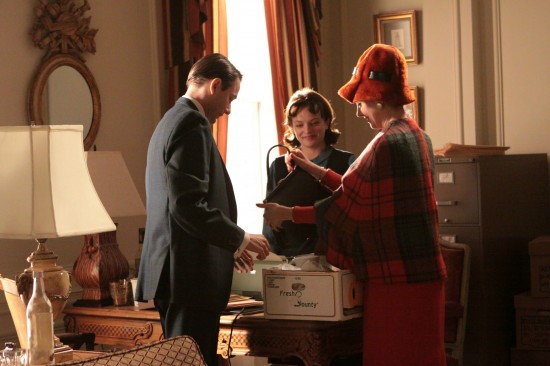 New Era, New "Company": As the finale's title hinted, the ep was a game-changing event consisting of three simultaneous and sharp separations: the looming divorce of Betty and Don; the overly submissive Lane Pryce from his ridiculous, flabbergasted British higher-ups; and the forever awesome move of Roger Sterling, Bertram Cooper, Draper, Peggy Olson, Pete Campbell, and Harry Crane from Sterling Cooper over to–tada!—Sterling Cooper Draper Pryce. Oh, and of course Sterling placed a "discreet" phone call to Joan Holloway, who arrived shortly thereafter on the scene in a pair of pants. Without so much as a prolonged blink, Joan dished instructions out like a hyperbolic '60s comic book version of herself. (More on the surreal tone of this later.)
New Era, New "Company": As the finale's title hinted, the ep was a game-changing event consisting of three simultaneous and sharp separations: the looming divorce of Betty and Don; the overly submissive Lane Pryce from his ridiculous, flabbergasted British higher-ups; and the forever awesome move of Roger Sterling, Bertram Cooper, Draper, Peggy Olson, Pete Campbell, and Harry Crane from Sterling Cooper over to–tada!—Sterling Cooper Draper Pryce. Oh, and of course Sterling placed a "discreet" phone call to Joan Holloway, who arrived shortly thereafter on the scene in a pair of pants. Without so much as a prolonged blink, Joan dished instructions out like a hyperbolic '60s comic book version of herself. (More on the surreal tone of this later.)
In case any '80s babies forgot, divorces tend to leave bright-eyed casualties strewn alongside the warpath. Betty and Don's divorce came as a tearful shock to the ever-brooding, lispy and mature, Sally Draper, and the ever-clueless Bobby Draper ("...cufflinks," really dude?). And in in a finer example of the occasionally heavy-handed and impersonal symmetry that Weiner is obsessed with, the formation of Sterling Cooper Draper Pryce left employees like the do-gooder Ken Cosgrove and huffy Paul Kinsey in the dust of a traditional office. Will those characters be included next season? The same can be asked of the completely fired, M.I.A. and A.W.O.L. Salvatore Romano. Weiner confesses...
I am going to say something that I don't always say: I don't know.
Should They Stay or Should They Go: But the more pertinent observation from a viewers' standpoint is: I don't know if I care. With the exception of Romano, whose arc is culturally relevant to times past and current, season three failed to develop Kinsey (he's an entitled, scruffy beatnik, okay...and?), and Ken Cosgrove arguably suffered the most. He was basically an office shadow that beamed with signature hair gel and a perma-grin all season.
Even with Cosgrove's promotion over Pete Campbell, as unveiled by a friendly but smug Pryce, not to mention his infamy as the guy who introduced New York City (and a foot) to John Deere, three seasons later, who the hell is Cosgrove? Is he still beaming from having a piece published in The Atlantic Monthly? Does he still write? No idea. You? The tinge of betrayal and sympathy and shock that should have spined out in the "Sterling Cooper's been robbed!" scene, merely imploded with: "Well, these characters are surprisingly kind of disposable." At this point, we know what makes Sally Draper tick arguably as much as these guys. Would more fans miss the hypothetical absence of Sally next season than both Kinsey and Cosgrove? And if so, is that a sign of so many peripheral characters weighing down on the premise and setting that hooked everyone in the first place?
Office Life: In a way, it makes sense that Weiner, after venturing so far away from the day-to-day of Sterling Cooper, would literally rein its key players into a smaller, far more personal working environment at season's end. The immediacy of this decision leaves season four opens to the fresh possibilities and character insights that occurred when Michael Scott started The Michael Scott Paper Company on The Office. Recall that Michael also recruited his best, semi-disgruntled employees: exchange Pam for Peggy and Ryan for Pete (even down to Pete likely ending up on his ass if he chose to leave the company). I get that sense that Weiner may have been keeping his distance in terms of growing these relationships because, like so many real offices, the environment and emphasis on real goals had grown stagnant.
But continuing with this comparison, even though Kevin and Creed play less active and scripted roles in The Office, many fans would go apeshit if they permanently left the show (given, more seasons have passed, but still). Furthermore: Would it not have been interesting if Weiner had laid off the lays and given Hollis the Black Elevator Operator (goodbye!) a minor yet interesting subplot not unlike Darryl the Black Warehouse Foreman on The Office?
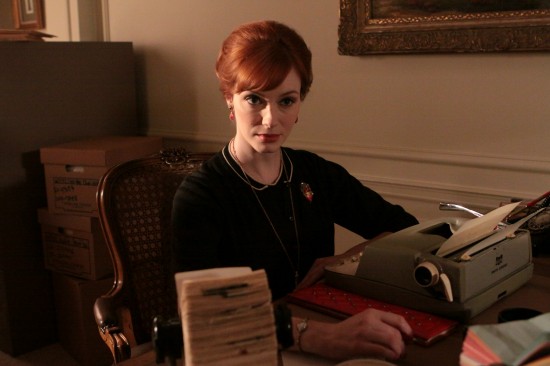 At Your Service: Viewers who feigned serious concern over the topic of Joan Holloway's non-return to the show late in the season were becoming annoying. In almost flamboyant fashion, Weiner reintroduced Holloway in the finale to the life and career she knows better than anyone. And as the realities of Roger Sterling's Summer-Winter marriage to Jane become apparent—she drunkenly blacks out more than girls at Duke University—Joan has once again become an affair-prospect for Roger. It's notable that the last time we saw Jane—in the previous episode—she was passed out with one hand on Roger's leg as he made a friendly phone call to Joan. With season four, perhaps more? Weiner admits...
At Your Service: Viewers who feigned serious concern over the topic of Joan Holloway's non-return to the show late in the season were becoming annoying. In almost flamboyant fashion, Weiner reintroduced Holloway in the finale to the life and career she knows better than anyone. And as the realities of Roger Sterling's Summer-Winter marriage to Jane become apparent—she drunkenly blacks out more than girls at Duke University—Joan has once again become an affair-prospect for Roger. It's notable that the last time we saw Jane—in the previous episode—she was passed out with one hand on Roger's leg as he made a friendly phone call to Joan. With season four, perhaps more? Weiner admits...
I am not big on giving the audience what they want but I am big on giving Roger and Joan what they want, if they can get close to it.
As Bertram Cooper informs Roger—who uber-briefly entertained a life of golf and retirement in the finale—he's not getting any younger. Work is what keeps Bert going, and he tells Roger it's the same for him: New York competition and "the hunger." But this seems more true for Bert—who appeared more eccentric and scatter-shot this season than in the past—and Don, who thrives on independence and a steely confidence maintained by "moving forward." What really keeps Roger going, in my opinion, is companionship and love affairs that are less serious but deeper than Draper's flings. (Including Don's latest with the hippy-dippy teacher, a character sure to return next season.) Perhaps, after decades of sampling behind previous wife's back and in face of an evident maturity-fissure with Jane, Sterling has set his bulls-eye on that ginger broad for good. (We all forecast Weiner issuing Joan's incompetent, rapist husband, Greg, off to to die in VietNam, right?)
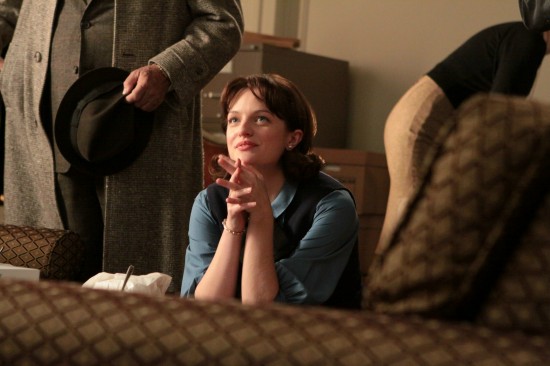 Duck, Duck, Gross: There was no shortage of predictions that pegged Herman "Duck" Phillips swinging in and playing a role in a bid on Sterling Cooper in the finale. After all, Duck's rather gross "nooners" with Peggy in various hotel rooms have left an icky, business-is-war anticipation. When Duck attempted to recruit the top employee(s) and protege(s) of Don, his much stronger adversary, by playing to her weaknesses, it recalled a lesson from How to Win Friends and Influence People; when Duck proceeded to bang said protege multiple times as an expression of dominance over said adversary, it recalled a questionable lesson from The 48 Laws of Power.
Duck, Duck, Gross: There was no shortage of predictions that pegged Herman "Duck" Phillips swinging in and playing a role in a bid on Sterling Cooper in the finale. After all, Duck's rather gross "nooners" with Peggy in various hotel rooms have left an icky, business-is-war anticipation. When Duck attempted to recruit the top employee(s) and protege(s) of Don, his much stronger adversary, by playing to her weaknesses, it recalled a lesson from How to Win Friends and Influence People; when Duck proceeded to bang said protege multiple times as an expression of dominance over said adversary, it recalled a questionable lesson from The 48 Laws of Power.
In a season that saw Don Draper rediscover his identity by being forced to (and subconsciously allowing himself to) shed the Draper facade, the finale brought into focus the meaningful symmetry of Betty Draper and Peggy Olson. With the exception of Sally Draper, these are the two most important and vital females in Draper's life (for now), and he has left both of them in states of uncertainty and loneliness for the entire season, even as he continued to dish out harsh reprimands and reality-checks.
His failure in this regard led to the manifestations in secrecy of Betty's relationship with Henry Francis and Peggy's with—and far more quizzically—Duck. Both of these women sought the comfort, compliments, and father-like guidance of an older man with power equal to Don's (though Duck's may be illusory; he operates out of hotel rooms) and attention and affection that far surpassed his. Matthew Weiner explains...
Don does identify with Peggy; she's more like Don than anybody else, whether she realizes it or not... Don is hard on her the way he's hard on himself... That speech to me is about him—about losing his marriage and the way he saw himself—it's about her and her past...
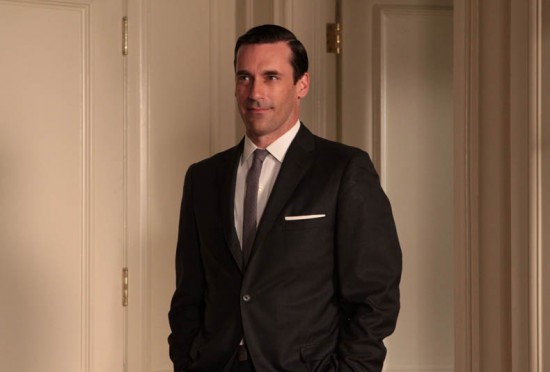
I've read PG-13 fan discussions pertaining to whether Don and Peggy would ever bang. As Weiner states, it's more of a brother-sister relationship, though one couldn't help notice the similarities between Don promising to "spend the rest of my life trying to hire you," and Henry Francis forever offering Betty everything she ever wanted in life. When Don tells Peggy, after visiting her at her semi-new apartment, that he doesn't know if he can make it without her, the similarity to Henry's line about eternity is obvious. If Draper really cared about saving his marriage, this is the type of selfless confession he'd have to make to Betty. Whether she would accept it (probably not) is beside the point.
What's unfortunate about the finale is that the urgency of Peggy coming aboard Sterling Cooper Draper Pryce didn't sing the way it should have; Peggy's teary eyes as she sat across from Don left me wondering if, like with Henry and Betty, more had occurred between Don and Peggy on a platonic level than the season illustrated. Peggy simply hasn't been present enough this season to make her anger and sadness palpable; when she asked for more credit and respect from Don earlier this season, his refusal mirrored, in an agreeable fashion, that of Conrad Hilton's bluntness to Don in the finale: earn it, tooth and nail.
It's also odd not so much that Duck failed to appear in the episode but that Peggy did not consult with him per his earlier offer in face of Don's makeshift extension of camaraderie. Drawing these two adversaries closer is the fact that Duck has likely sat on the same couch that Don was sitting on as he reiterated his offer. (Viewers may or may not recall that Peggy's roommate recently remarked that Duck had been sleeping over.) What ultimately sucks some power out of the episode is that fans know, not unlike Joan's detour, that Olson is too vital a character (and Moss too vital an actress) to not rejoin with Don (as it happens, this occurs in the finale, but rejoining him in season four would be no more the surprise).
In season four, how will Weiner and his creative team up the ante beyond the critically dissected production design and fashion?
[Getting rid of Sterling Cooper] was very scary but I knew in my heart it was what I had to do. I have to believe that if Don is as good as he says he is, there's no way he's going to go through the '60s working at a firm like Sterling Cooper. It's got to be something different... Life is change.
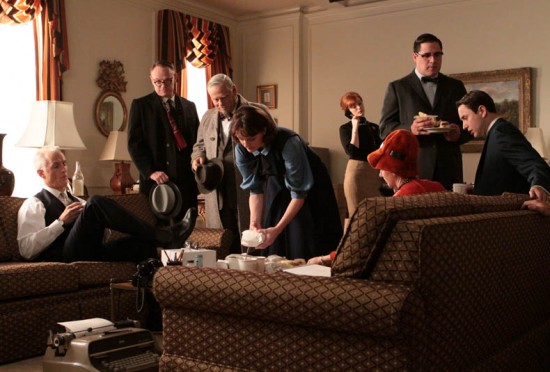
The above still—and the coinciding scene—offers a surreality that is almost dizzying. With no walls and no barriers, and no closed doors, there is almost a randoms-off-the-street-pose-for-painting air to it. Screw cleaning the carpets, Weiner aspires to place all of his characters into a box, shake them up, and place them back into a masterplan where "Life is change." And one can be sure, based on all three seasons, that this motto carries darker lows to level out the exhilarating highs (which the show, frankly, needs more of).
But unlike The Sopranos, where Weiner sharpened his teeth, or AMC's Breaking Bad (which, in my mind, had a better season, but with a dreadful finale), I can't shake the feeling that I don't really know this ensemble of characters. Not in the existential way, either. Too often this season of Mad Men was akin to knowing and understanding well-calculated, animated, and intelligent chess pieces. Mad Men is still one of my favorite shows and deserves all of the ratings and awards it can get, but this is the season where I paid more attention to Weiner's strings, manipulations, and alignments of traits and events, than to any genuine character investment as a fan. And not by choice.
Now that that Ice Bitch, Betty Draper, is out of the way, I look forward to watching a newly sideburned Don Draper sit on a carpet inside his sure-to-be-cool bachelor pad and play Beatles records to his attentive kids. But hopefully, only on weekends. Don Draper declared in the finale that he wants to work; now that his family life has fragmented, I hope that season four sees his renewed professional life placed front and center.
Best Actor of Season Three: John SlatteryBest Jokes of Season Three: John Slattery (duh)Best Actress of Season Three: Christina HendricksBest Episode of Season Three: "The Gypsy and the Hobo"Best Scene of Season Three: Lawnmower accident, "Guy Walks Into an Advertising Agency"Special Season Three Raise Recommendation: Carla (Deborah Lacey)Season Three Finale /Film Rating: 8/10Season Three /Film Rating: 8.5/10
For /Film's previous recap of Mad Men's third season, click here. Hat tip to @mfiege for a quick answer per this article.
Hunter Stephenson can be reached at h.attila/gmail and on Twitter.
